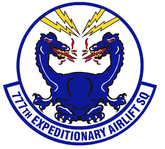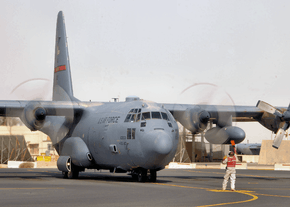777th Expeditionary Airlift Squadron
| 777th Expeditionary Airlift Squadron | |
|---|---|
|
A C-130 Hercules if the 777th Expeditionary Airlift Squadron is marshaled into position at Joint Base Balad, Iraq | |
| Active | 1943–1945; 1953–1971; 2000s (decade) |
| Country | United States |
| Branch |
|
| Role | Airlift |
| Insignia | |
| 777th Expeditionary Airlft Squadron emblem (approved 16 April 1958)[1] |
 |
| Tail Code 1968–1971 | PB |
The 777th Expeditionary Airlift Squadron is a provisional United States Air Force squadron activated after 11 September 2001, being engaged in the Global War on Terrorism. Its current status is undetermined.
Previously, the squadron was a Tactical Air Command Tactical Airlift squadron, assigned to the 464th Tactical Airlift Wing, stationed at Pope Air Force Base, North Carolina. It was inactivated on 31 August. During World War II, the 777th Bombardment Squadron was a B-24 Liberator heavy bomb squadron which saw combat with Fifteenth Air Force stationed in Italy, assigned to the 464th Bombardment Group.
History
World War II
Established as a B-24 Liberator heavy bomber squadron in mid-1943, trained under Second Air Force. Deployed to Mediterranean Theater of Operations (MTO), October 1943, becoming a Fifteenth Air Force heavy bomb squadron, attacking enemy targets both in the MTO and European Theater of Operations (ETO). After end of war in Europe, used B-24s for transport of personnel from various points in Europe to Waller Field, Trinidad, being attached to Air Transport Command. Inactivated 31 July 1945.
Tactical Air Command
Reactivated as a Tactical Air Command theater transport squadron, 1953. Performed Troop Carrier missions using tactical transport aircraft until 1971 when inactivated.
Expeditionary unit

Activated as a C-130 Hercules airlift squadron as part of the Global War on Terrorism after 9 September 2001.
Lineage
- Constituted as the 777th Bombardment Squadron (Heavy) on 19 May 1943
- Activated on 1 August 1943
- Redesignated 777th Bombardment Squadron, Heavy on 29 September 1944
- Inactivated on 31 July 1945
- Redesignated 777th Bombardment Squadron, Very Heavy on 14 November 1945 (Remained inactive)
- Redesignated 777th Troop Carrier Squadron, Medium on 15 December 1952
- Activated on 1 February 1953
- Redesignated: 777th Troop Carrier Squadron, Assault on 1 December 1958
- Redesignated: 777th Troop Carrier Squadron, Medium on 8 January 1964
- Redesignated: 777th Troop Carrier Squadron on 1 March 1966
- Redesignated: 777th Troop Tactical Airlift Squadron on 1 May 1967
- Inactivated on 31 August 1971 Assets absorbed by 39th Tactical Airlift Squadron.
- Converted to provisional status and redesignated as 777th Expeditionary Airlift Squadron on undetermined date.
- Assigned to Air Mobility Command to activate or inactivate at any time.
Assignments
- 464th Bombardment Group, 1 August 1943 – 31 July 1945
- Attached to Air Transport Command, 15 June-31 July 1945
- 464th Troop Carrier Group, 1 February 1953
- 464th Troop Carrier (later Tactical Airlift) Wing, 11 November 1957 – 31 August 1971 (attached to 315th Air Division, 31 March 1968 – 1 August 1968)[2]
- Air Mobility Command, undetermined
Stations
|
|
Aircraft
- B-24 Liberator, 1943–1945
- C-46 Commando, 1953–1954
- C-119 Flying Boxcar, 1953–1958
- C-123 Provider, 1958–1968
- C-130 Hercules, 1968–1971; undetermined
References
Notes
- ↑ Maurer, Maurer, ed. (1982) [1969]. Combat Squadrons of the Air Force, World War II (PDF) (reprint ed.). Washington, DC: Office of Air Force History. pp. 750–751. ISBN 0-405-12194-6. LCCN 70605402. OCLC 72556.
- ↑ "Factsheet 315 Air Division". Air Force Historical Research Agency. 12 October 2007. Archived from the original on 30 October 2012. Retrieved 24 February 2014.
Bibliography
![]() This article incorporates public domain material from the Air Force Historical Research Agency website http://www.afhra.af.mil/.
This article incorporates public domain material from the Air Force Historical Research Agency website http://www.afhra.af.mil/.
- Maurer, Maurer, ed. (1982) [1969]. Combat Squadrons of the Air Force, World War II (PDF) (reprint ed.). Washington, DC: Office of Air Force History. ISBN 0-405-12194-6. LCCN 70605402. OCLC 72556.
